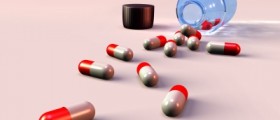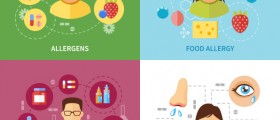
Iodine allergy is not so common type of allergy. People suffering from iodine allergy are allergic to iodine applied in a form of certain solutions and contract dyes. They, however, may continue consuming foods rich in iodine which is the only source of the mineral essential for proper functioning of the thyroid gland.
Iodine allergy usually manifests during certain diagnostic procedure which include application of contrast dyes. These are administered to improve X-ray images. However, if given to people with iodine allergy, such substances may cause serious allergic reaction. This is why prior applying contrast dyes one is supposed to be tested for iodine allergy.
Iodine Allergy and Foods?
Even though many people who have to face iodine allergy believe they should abstain from foods containing iodine such as shellfish, shrimp etc. they are wrong. Scientists have proven that there is no connection between iodine allergy and consumption of iodine rich foods, especially sea food. But if an individual is confirmed to be allergic to shellfish or other sea foods, he/she is supposed to avoid these foods and may also explore whether there are other allergies including iodine allergy.
Iodine Allergy Clinical Characteristics
The allergic reaction is in this case quite similar to any other allergy. For instance, after application of solutions containing iodine, there may be skin itching, rashes and hives. Runny nose, red or watery eyes are additional symptoms and signs associated with iodine allergy. Since allergy is usually serious it may be in a form of anaphylactic shock. There is swelling of the throat, severe breathing difficulties, circulatory collapse and potential lethal outcome if one is not treated immediately. Anaphylactic shock is a life-threatening medical condition which must be taken care of instantly.
Iodine Allergy Treatment and Prevention
Treatment for iodine allergy is symptomatic, meaning that all the administered medications take care of symptoms and signs of the allergy. Hives and skin rash are easily brought under control with antihistamines and oral/topical corticosteroids. These medications are supposed to be used only after a consultation with a well-experienced allergist. Anaphylactic shock requires urgent medical care. There are several medications which are administered intravenously in order to achieve fast effects. Patients receive adrenalin, antihistamines and several more drugs according to a specific scheme.
In order to prevent repeated episodes of the allergic reaction, one is supposed to report iodine allergy every time he/she undergoes exams and test which include applications of iodide contrast dies or in case doctor opts for some treatment with drugs containing iodine.

















Your thoughts on this
Loading...